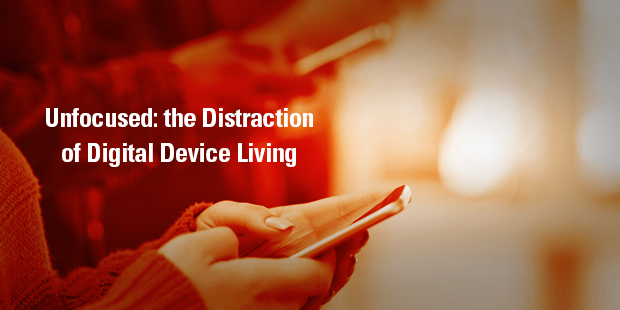
Unfocused: the Distraction of Digital Device Living
It’s no secret that new technologies and online habits are changing us in subtle yet profound ways, giving rise to new experiences and expectations. Writers like Tony Reinke, Andy Crouch, and Cal Newport have given us books rich with insight regarding the effect of the smartphone and social media. The Four-Dimensional Human by Laurence Scott joins the growing list of works that consider the effects of technological change.
Scott opens with a story from years ago when he dashed off a postcard to a friend far away and then moments later—ridiculously—experienced a sense of frustration: Why haven’t I received a response yet? Somehow, in some way, the instant communication made possible by email had changed what Scott’s expectations.
“This postcard from the edge of reason came to feel like a developmental milestone, an instant of self-consciousness in which it became clear that I was undergoing a transformation. I was being freshly coded with certain expectations of the world, one of which seemed to be an unflagging belief in the responsiveness of others and which never seemed to learn from its disappointments. Digital technology was reshaping my responses, collaborating with my instincts, creating in me, its subject, all kinds of new sensitivities.” (xiii)
The digital revolution changes what we expect from the world. We expect people to be responsive. We expect acknowledgement of a text message or email. If hours (or even minutes) go by without a simple “like,” we wonder why someone hasn’t acknowledged our comment on a social-media platform. We expect ease in shopping, in ordering food, and in accessing the maps we need to find our way to a physical location.
Just this weekend, I found a great deal at Barnes and Noble on a hardcover book, which I started reading at home. So engrossed was I in the story it told that I decided to forgo reading my Kindle while on my exercise machine, choosing instead to prop up the book where I usually put my eReader. At one point, to my own surprise, I pressed the edge of the book’s page, expecting it to turn automatically, as if the paper was a responsive screen!
Changing expectations aren’t new. Every time an invention leads to technological advance, our expectations change. We rely on the microwave, which changes how we think of leftovers. We rely on the refrigerator, which changes the amount of food we buy during a visit to the supermarket. We rely on air conditioning, which changes what we view as comfort in the home.
(When our upstairs unit froze up earlier this summer and I found out it would be a few days before the technician would be out to see it, I was distressed to discover that air conditioning is considered a luxury, not a necessity. A luxury? Tell that to my sweating family when it’s 90 degrees outside with 70 percent humidity! I imagine my great grandparents rolling their eyes at me from the grave, remembering how a century ago everyone worked their schedules around the heat of the day.)
New developments always change our expectations. But it’s the fast-paced change brought about by the digital revolution that has led to so many new expectations in such a short amount of time. Consider what has recently become accepted in our interactions. Scott points out the normalcy of “elsewhereness.”
“We may often seem elsewhere to those physically nearest us. It has become a part of the everyday rhythm of social life that we dart in and out of each other’s view—here one minute, gone the next: ‘I’m just checking . . . ’; ‘I’ll just answer this . . .’; . . . This intermittent elsewhereness has come to seem an ordinary aspect of human behavior.” (17)
What would have once been seen as distracting and impolite is now considered a normal element of human communication. Ten years ago, the person glued to their Blackberry during a dinner party would apologize and give excuses for their lack of attention. Today, we expect people to glance at their phones during any lull in conversation even if nothing is urgent.
The flip side to this “elsewhereness” is that we never feel as far away from home. When so much of our time is spent on a mobile device, we feel “connected” to home base even when we’re far away. Scott writes:
“Wherever we go, part of us is always at home. A thousand miles from our loved ones, we can pull a stranger’s blanket up to our chin and manage not to feel eerie, soothed no doubt by the night lights of our phones and laptops.” (32)
And then there are expectations that come from our increasing reliance on social media for both news and entertainment. The town square—Facebook comments and Twitter streams—share space with the latest trending video or funny meme, so that even important topics of conversation are swept into the same whirlpool of videos that provide our entertainment. “Social media can encourage us to think of people as a sort of casual entertainment,” Scott writes, “as something which we can dip in and out of, and sometimes flick to mute” (155).
We need more and better reflection on how our digital habits change our expectations. Unfortunately, everything about this revolution steers us toward distraction rather than focus. It will take significant effort to develop habits of concentration and resistance if we are to maintain the skills necessary to even see the ways in which our world may transform us into shallow and superficial people.
Surely our obedience to the apostle Paul’s call to “not be conformed to this age, but be transformed by the renewing of your mind” (Rom. 12:2), extends to our ways of being in a digital world. The act of discerning “what is the good, pleasing, and perfect will of God” is a worthy goal in every generation, even one as connected as ours.













